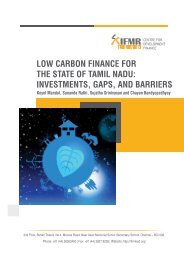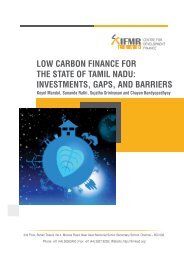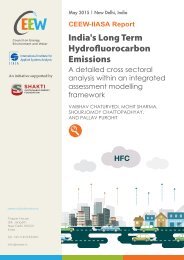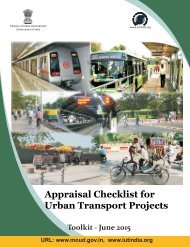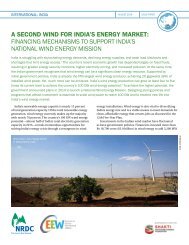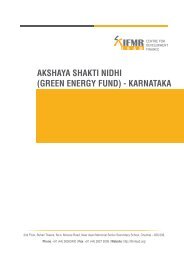Enhancing India’s Readiness to Climate Finance
India has taken several steps to improve its national response to climate change. India’s climate finance requirements, however, are very high, and will need to be met through a combination of public, private and international climate finance. See more at: http://shaktifoundation.in/
India has taken several steps to improve its national response to climate change. India’s climate finance requirements, however, are very high, and will need to be met through a combination of public, private and international climate finance. See more at: http://shaktifoundation.in/
- No tags were found...
You also want an ePaper? Increase the reach of your titles
YUMPU automatically turns print PDFs into web optimized ePapers that Google loves.
<strong>Enhancing</strong> <strong>India’s</strong> readiness <strong>to</strong> access and deliver international climate finance<br />
support key national nodal agencies in mainstreaming domestic and international action on<br />
climate change – particularly on issues related <strong>to</strong> financing.<br />
<br />
<strong>Climate</strong> change planning and financing at the State level is at a very early stage of<br />
development. The 12 th FYP document emphases that most of the resources required for<br />
sec<strong>to</strong>ral actions under the State Action Plans will need <strong>to</strong> be provided by State Governments.<br />
However the 13 th <strong>Finance</strong> Commission of India suggested that central government transfers <strong>to</strong><br />
States could support climate change activities. Towards this end, an umbrella scheme on<br />
<strong>Climate</strong> Change Action Programme is proposed <strong>to</strong> be launched during the 12 th FYP. Support<br />
<strong>to</strong> State Governments could be based on a set of transparent and objective criteria <strong>to</strong> be<br />
moni<strong>to</strong>red by a Steering Committee in the MoEFCC. In addition, State Government may<br />
earmark provisions for implementing activities under their SAPCC.<br />
7. Role/engagement of private sec<strong>to</strong>r – Is the private sec<strong>to</strong>r involved in the national<br />
climate change response?<br />
1<br />
<br />
<br />
<br />
The Government of India has provided regula<strong>to</strong>ry mechanisms and economic<br />
incentives for engaging the private sec<strong>to</strong>r, but actual deployment of programmes has<br />
been slow. GoI has attempted <strong>to</strong> engage the private sec<strong>to</strong>r through incentives such as Feed<br />
in Tariff (FITs), fiscal incentives, generation-based incentives, market instruments<br />
(Performance, Achieve and Trade (PAT) and Renewable Energy Certificates (REC)), access<br />
<strong>to</strong> international capital and streamlined approval processes for projects. The deployment of<br />
PAT, REC and FITs has been hampered due <strong>to</strong> enforcement and early stage implementation<br />
issues. Other GoI programmes such as the Partial Risk and Guarantee Fund (PRGF), Venture<br />
Capital Fund (VCF), NCEF <strong>to</strong> attract private sec<strong>to</strong>r investment are still under development.<br />
There has been major private sec<strong>to</strong>r investment in the RE sec<strong>to</strong>r, but government<br />
incentives <strong>to</strong> attract private investment in other climate related sec<strong>to</strong>rs have been<br />
limited. Private sec<strong>to</strong>r understanding of climate change impact is very limited. Hence,<br />
investment plans rarely include implication of climate change on investments. There have<br />
been limited public-private forums put in place <strong>to</strong> engage the private sec<strong>to</strong>r on climate change<br />
issues in order <strong>to</strong> address this imbalance, and there is no private sec<strong>to</strong>r representation in any<br />
of the national committees and bodies on climate change. <strong>Climate</strong> change concerns are<br />
limited <strong>to</strong> GHG accounting under CSR obligations for some private sec<strong>to</strong>r players.<br />
There is a limited understanding of climate risk in private sec<strong>to</strong>r investments. There is a<br />
need <strong>to</strong> develop innovative market-based financing mechanisms in the form of infrastructure<br />
debt funds, green bonds, etc. <strong>to</strong> promote greater private sec<strong>to</strong>r investments. Currently,<br />
operating and maintenance insurance is available for wind, solar, and general engineering,<br />
procurement and construction (EPC) risk-related insurance.<br />
5.4 Financial function<br />
5.4.1 Headline messages<br />
India has strong experience in accessing and delivering international finance for renewable<br />
energy projects, and more limited experience in financing EE and resource efficiency<br />
projects.<br />
Agent/ac<strong>to</strong>r/institution:<br />
Competency Gaps:<br />
NABARD, IREDA, SIDBI, PFC, IDBI, IDFC and BEE.<br />
Limited capacity <strong>to</strong> scale up existing programmes, deliver finance <strong>to</strong><br />
other specific sec<strong>to</strong>rs, and extend <strong>to</strong> wider regional coverage.<br />
Delivering projects with blended finance has been limited.<br />
Ref: Ricardo-AEA/R/ED59216/Final Report<br />
32




